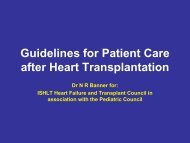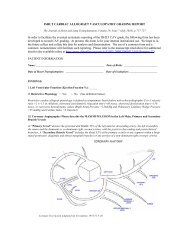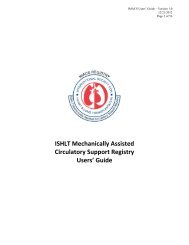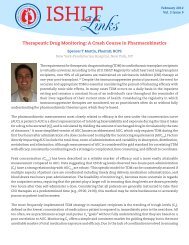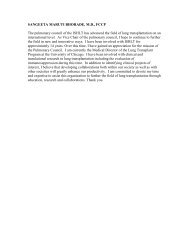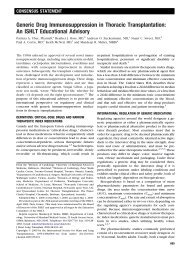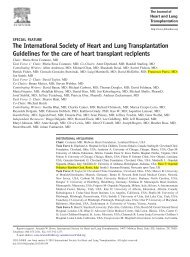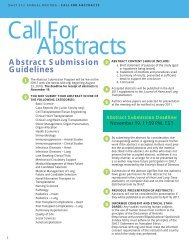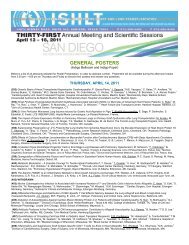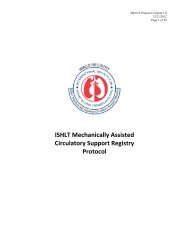Task Force 4: Inpatient Management of Patients with MCSD - The ...
Task Force 4: Inpatient Management of Patients with MCSD - The ...
Task Force 4: Inpatient Management of Patients with MCSD - The ...
You also want an ePaper? Increase the reach of your titles
YUMPU automatically turns print PDFs into web optimized ePapers that Google loves.
may also be related to the type <strong>of</strong> MCS device. For example, BiVADs may affect<br />
independence from a “lifestyle” perspective, as patients are tethered to a machine or<br />
must use a driver on a wheeled cart. As a result, these patients are less able to<br />
function independently. In contrast, patients <strong>with</strong> LVADs who are discharged <strong>with</strong> a<br />
“wearable system” carry the external components in a fanny pack. 52 Finally,<br />
psychosocial support may be indicated for patients and families while learning to<br />
manage and troubleshoot the <strong>MCSD</strong>, if they have concerns about their knowledge <strong>of</strong><br />
MCS, lack confidence in <strong>MCSD</strong> management, or become overwhelmed. 51<br />
<strong>The</strong>re is also evidence in the literature regarding psychological sequelae early<br />
after MCS implantation. Anxiety, lack <strong>of</strong> control over one’s life, and depression have<br />
been reported in hospitalized patients after MCS implantation. 53-55 <strong>Patients</strong> have also<br />
reported moderate levels <strong>of</strong> stress related to having advanced heart failure, being<br />
hospitalized and away from family, the need for MCS, and post-operative pain. 54<br />
Uncertainty may also be an important factor causing stress, especially for “bridge to<br />
candidacy” patients. Furthermore, family distress also requires monitoring and<br />
intervention. Psychiatric symptoms may predict nonadherence to the medical regimen,<br />
unhealthy lifestyle (including substance abuse), poor medical outcomes, and poor<br />
health related quality <strong>of</strong> life after discharge. 51<br />
Despite the stress associated <strong>with</strong> hospitalization for MCS, patients have also<br />
generally reported that they were coping fairly well, although not as well as their selfreport<br />
<strong>of</strong> overall coping prior to surgery. 54 At 2 weeks after MCS (while still<br />
hospitalized), patients used more positive coping styles (e.g., optimistic, self-reliant, and<br />
supportant) than negative coping styles (e.g., fatalistic, evasive, and emotive), and<br />
positive coping was more effective than negative coping. 54 Importantly, psychological<br />
assessment and intervention is needed for patients who use negative coping strategies.<br />
Interestingly, at both 2 weeks and 1 month after surgery (while still hospitalized), the<br />
vast majority <strong>of</strong> BTT patients reported no regret regarding having undergone MCS<br />
implantation, citing that the MCS saved their lives. 54,55 This “honeymoon phase” may be<br />
related to relief regarding surviving surgery, denial, and not considering the demands <strong>of</strong><br />
self-care, prognosis (especially for DT patients), and the possible complications <strong>of</strong> MCS<br />
(e.g., stroke) on lifestyle and long-term quality <strong>of</strong> life. 51,54,55 It is important to note that<br />
17






